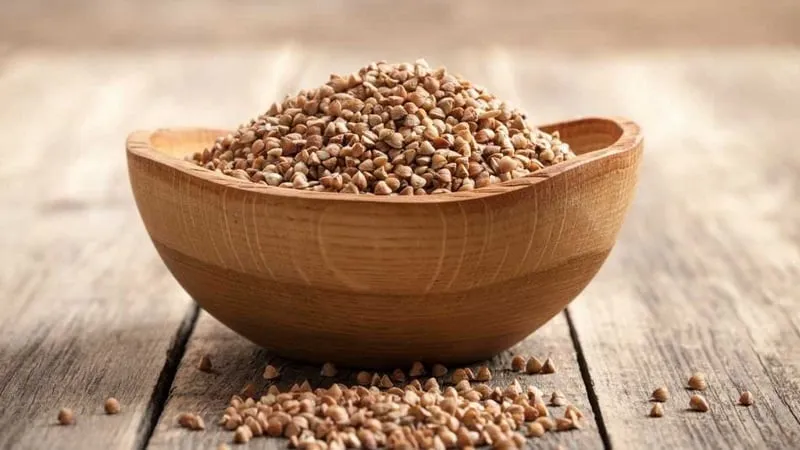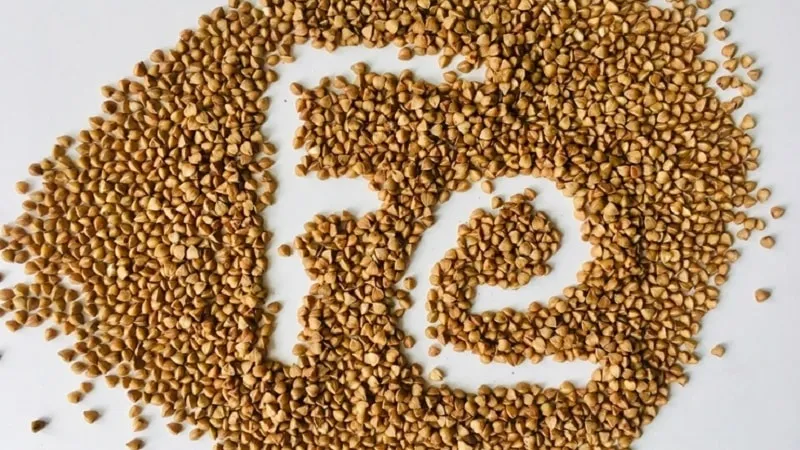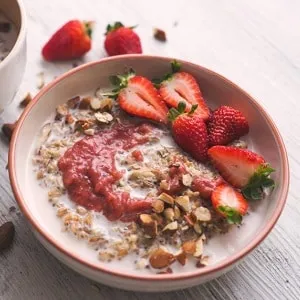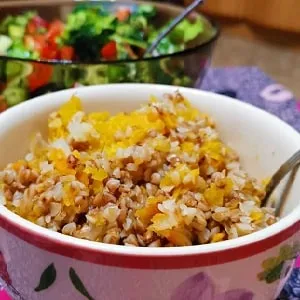From the very beginning of pregnancy, a woman changes her dietary principles. A special diet is linked to the needs of the baby growing in the womb. Many familiar foods are excluded from the menu, which increases the risk of deficiencies in certain nutrients. A simple product like buckwheat during pregnancy can replenish the lack of minerals and vitamins, nourish the mother's body, and support the fetus.
Table of contents
Properties of Buckwheat
The benefits of the product are determined by its composition. The high content of vitamins and minerals makes this grain indispensable for a healthy diet.

Chemical Composition
The high nutritional value of buckwheat allows it to be included in the daily diet. The calorie content of 100 g of raw buckwheat is approximately 310 kcal. For porridge cooked in water, this figure is lower — 110 kcal.
Nutritional value per 100 g:
- carbohydrates — 58 g;
- proteins — 12.4 g;
- fats — 3.4 g.
Mineral content per 100 g of raw buckwheat:
- boron — 1043% of the daily requirement;
- vanadium — 425%;
- silicon — 400%;
- manganese — 88%;
- rubidium — 71%;
- copper — 66%;
- magnesium — 61%;
- iron — 55%;
- molybdenum — 55%;
- phosphorus — 44%;
- zinc — 23%;
- selenium — 22%;
- potassium — 16%;
- chromium — 12%.
Vitamin content:
- E — 32%;
- B vitamins (B1, B2, B5, B6, B9) — up to 25%;
- biotin — 21%;
- PP — 20%;
- choline — 14%;
- K — 9%.
Porridge cooked with milk (with a small amount of sugar) contains approximately 120 kcal.

Nutritional value of milk porridge per 100 g:
- carbohydrates — 22 g;
- proteins — 4.5 g;
- fats — 2.5 g.
Milk complements the composition of buckwheat with vitamin B12, calcium, and sodium.
Benefits for Women
Buckwheat helps maintain health, preserve youth and beauty, and boost immunity.
Interesting fact! Buckwheat is considered a "female" product due to its high (150%) content of beta-sitosterol — a phytosterol with anti-androgenic properties. This substance suppresses the activity of male hormones when consumed in large quantities.
Is Buckwheat Beneficial During Pregnancy?
Rich in vitamins and minerals, buckwheat is essential in the diet of an expectant mother:
- the flavonoid rutin strengthens blood vessels, maintains their elasticity, and normalizes blood pressure, which often rises, especially in early pregnancy;
- lipotropic substances protect the liver and strengthen the cardiovascular system;
- essential and non-essential amino acids maintain acid-base balance and accelerate metabolism;
- dietary fiber normalizes metabolic processes and digestion.
Proteins and carbohydrates contribute to the proper formation of new cellular structures and provide the body with energy.
Can You Eat Buckwheat During Pregnancy?
Buckwheat is not only beneficial but also necessary for pregnant women. However, it is advisable to consult a doctor beforehand to rule out any contraindications.
In the First Trimester
One of the most important elements for a pregnant woman at any stage is iron. It supports normal hemoglobin levels in the mother and protects the baby from hypoxia.
Folic acid helps the fetus develop properly, preventing congenital defects and other pathologies. Buckwheat also cleanses the intestines, boosts immunity, and provides strength for carrying the baby.

In the Second Trimester
Flavonoids (quercetin and rutin) become particularly important. These natural antioxidants enhance the effect of vitamin C, which strengthens the immune system and protects against frequent colds.
In the Third Trimester
In the final trimester, it is crucial to monitor weight, as excess kilograms put significant strain on the body. Women may experience back and leg pain, persistent swelling, and varicose veins. Buckwheat helps maintain a healthy weight due to its low calorie content and high nutritional value, while also aiding in fluid elimination — a common cause of swelling.
Potential Risks
Buckwheat can pose risks if consumed improperly.
Important! In late pregnancy, excess weight is a major concern. Some women switch to a buckwheat-only diet to lose weight, which can harm both the mother and the baby.
Monodieting on buckwheat can lead to negative consequences:
- A lack of proteins and carbohydrates from other foods weakens the pregnant woman’s body, potentially harming the fetus and increasing the risk of developmental abnormalities.
- If a woman has an intolerance to buckwheat or its components, improper protein absorption or acute allergic reactions may occur.
Contraindications and Precautions
Despite its versatility, buckwheat should be avoided in certain cases.
Warning! Excessive consumption of buckwheat may trigger allergies in the baby.
Buckwheat is not recommended for:
- gastritis;
- stomach ulcers;
- duodenal ulcers;
- kidney failure;
- high stomach acidity.
Consumption Recommendations
The method of consumption depends on the type of buckwheat:
- green buckwheat is unprocessed and can be eaten raw;
- small-grain buckwheat is ideal for soft porridges, baking fillings, and stomach-sensitive diets;
- steamed buckwheat (common in Europe) is best for porridge during pregnancy;
- broken buckwheat is great for baby food as it steams easily.
Buckwheat pairs well with fruits, milk, or kefir. Dairy products help meet daily calcium needs.

Ways to consume buckwheat for specific conditions:
- For heartburn (common in pregnancy), 1 tsp of raw buckwheat on an empty stomach can help.
- For intestinal relief, mix 3 tbsp of buckwheat with 2/3 cup of fat-free yogurt or kefir. Refrigerate overnight and consume in the morning.
Buckwheat honey is also beneficial for pregnant women. It contains essential vitamins and minerals for fetal development.
Recipes
To diversify plain buckwheat porridge, try adding fruits or vegetables.
Milk Porridge with Fruits
This recipe is suitable for pregnant women who tolerate lactose.
Ingredients:
 buckwheat — 110 g;
buckwheat — 110 g;- low-fat milk — 500 ml;
- ripe strawberries — 110 g;
- banana — 1 pc.;
- kiwi — 1 pc.
Preparation:
- Rinse the buckwheat.
- Bring milk to a boil in a saucepan.
- Add buckwheat, reduce heat, and simmer for 25 minutes.
- Peel and chop the fruits.
- Serve the porridge with fruits. Sweeten with natural syrup or buckwheat honey if desired.
Buckwheat with Vegetables
For those who are lactose-intolerant, try this pumpkin buckwheat recipe. Pumpkin helps with morning sickness, supports the nervous system, and improves sleep quality. Carrots strengthen vision and the cardiovascular system.
Ingredients:
 pumpkin — 210 g;
pumpkin — 210 g;- buckwheat — 210 g;
- carrot — 1 pc.;
- water — 420 ml;
- salt — to taste.
Preparation:
- Dice or grate the pumpkin.
- Grate the carrot.
- Cook buckwheat in water.
- Sauté pumpkin and carrot in a pan with a little water for 10 minutes.
- Combine with buckwheat, add salt, and simmer for 30 minutes.
Opinions of Obstetricians and Gynecologists
Experts highlight the benefits of buckwheat but emphasize a balanced diet.
Sophie, 10 years of experience: “The first question my patients ask is: what can I eat? Among many foods, I recommend buckwheat (with milk, kefir, or yogurt if tolerated). Many initially hesitate but later thank me for the suggestion. This affordable product prevents anemia in early pregnancy and excessive weight gain later.”
Emma, 12 years of experience: “I advise buckwheat not only to my patients. It’s a nutritious grain rich in minerals and vitamins, but moderation is key. It shouldn’t replace all other foods.”
Conclusion
Buckwheat is a nutritious and beneficial product, especially valuable for pregnant women due to its high vitamin and mineral content, which supports both maternal and fetal health.
If digestive issues arise, consult a doctor before consuming buckwheat. Despite its benefits, it may cause allergies or metabolic imbalances.







